Online Symposium: “Gender & Diversity in Contemporary Yoga”
22 October 2020
This one-day symposium brings together scholars investigating yoga and other body-mind-spirit practices from a critical gender and diversity perspective.
Research has shown how Yoga in the contemporary West often caters for members of the white, urban middle-class, among which a majority of women, who seek a healthy life-style, relief from a stressful professional environment and/or personal development. Critical scholarship has pointed out the compliance of this kind of healthist and individual-oriented practices with neoliberal culture and its demands for self-management and self-optimization. Yet, from an intersectional perspective, feminist and critical race scholars have denounced the restrictive and exclusivist health and beauty ideals yoga upholds with the typical yogi being young, white, slim, sexy and able-bodied.
Expanding on this research, this symposium presents empirical, qualitative studies that investigate these dynamics in contemporary Western yoga or other body-mind-spirit settings and/or explore diverse forms of practice and resistance. Indeed, phenomenological approaches have uncovered how yoga, by developing inner awareness and approaching the body as one’s sanctuary, can be a means for acting against consumerist and restrictive (female) body-objectification. Moreover, initiatives are investigated that diverge from neoliberal exclusivist yoga and other BMS practices such as activist yoga, donation-based yoga, yoga or mindfulness for specific groups (for instance, older women, disabled people, migrant or refugee communities, etc.).
The symposium deals with the European context, which, from a gender & diversity perspective, remains understudied compared to North-America. Attention is also given to religion/spirituality, an often forgotten dimension in intersectional research which is particularly useful for interrogating the liberatory potential of body-mind-spirit practices in contemporary Europe’s post-secular climate.
Please register if you wish to attend by sending an email to carine.plancke@ugent.be.
Organisation:
Dr. Carine Plancke and Prof. Dr. Chia Longman
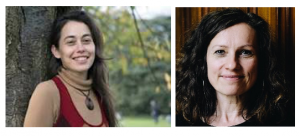


Programme (CEST)
09:00-09:10: Opening words by Prof. Dr. Chia Longman (University of Ghent)
Invited Lectures
09:15: 10:15: Asanas, aspirations and agency. attracting women to yoga — Vignettes from Post-War Germany and their impact for critical yoga studies
Lecture by Prof. Dr. Beatrix Hauser (University of Bremen)
10:20-11:20: Is yoga a middle-class girl thing? Questioning hegemonic portraits of yoga practitioners
Lecture by Prof. Dr. Maria del Mar Griera (Universidad Autónoma de Barcelona)
11:25-12:25: ”I’m going to be honest and … tell you that I feel like my emotions are all over the place right now”: the work of doing aesthetic and emotional labour in contemporary yoga teaching
Lecture by Dr. Jennifer Lea (University of Exeter)
Panels
14:00-15:30: Panel 1: Activism, feminism and inclusion in/through yoga
Moderator: Prof. Dr. Ladan Rahbari (University of Amsterdam)
Ella Poutiainen (University of Turku): Feminism, women’s spirituality and social change
Dr. Cassandra Ellerbe (Bard College Berlin): Kemetic Yoga and healing circles as a form of resistance for BIPOC women in Germany
Prof. Dr. Esther Sanchez-Pardo (University of Madrid): Yoga for educators: Affect and accountability in a culturally diverse environment
Dr. Caroline Nizard (University of Lausanne): Representations and paradoxes of modern yoga (well-being, sport and spirituality)
15:45-17:15: Panel 2: The politics and spirituality of self-care practices
Moderator: Eline Huygens (University of Ghent)
Gemma Lucas (University of Exeter): The enactment of ‘the (gendered) natural’ within spiritual assemblages
Dr. Aliette Lambert (University of Exeter) The liberatory potential of Tantra yoga
Prof. Dr. Sarah De Mul (Open University Netherlands): Tango as a Matter of Care in Neoliberal Brussels
Emanuela Mangiarotti (University of Genoa): Embodying self-care: Women in yoga
Invited lectures
Prof. Dr. Beatrix Hauser (University of Bremen): Attracting Women to Yoga — Vignettes from Post-War Germany and their Impact for Critical Yoga Studies
 Today yoga is one of the major physical regimes practiced by women. This popularity is usually linked to recent concerns about self-identity, holistic health and spiritual growth. However, from a critical point of view it is not clear whether and how the declared power of yoga indeed is empowering, particularly in a wider social sense — for women, and other groups of yoga practitioners.
Today yoga is one of the major physical regimes practiced by women. This popularity is usually linked to recent concerns about self-identity, holistic health and spiritual growth. However, from a critical point of view it is not clear whether and how the declared power of yoga indeed is empowering, particularly in a wider social sense — for women, and other groups of yoga practitioners.
Following the scholarship on the history of modern postural yoga, today’s bodily practice resulted from a transcultural multidirectional process of adopting, reframing and modifying ideas and body techniques, beginning in the late 19th century (see De Michelis, Alter, Singleton). In the course of this, a male-oriented revival of pre-modern posture (āsana) practice turned into a highly commoditized discipline, largely associated with softness and femininity. The term yoga became a floating signifier used in several interconnected discourses for a variety of ideas and practices.
In this key note I focus on a period that is, I argue, crucial for understanding present-day narratives on yoga and its potentially liberating effects for women: the 1950s. Focussing on early yoga manuals in German language that address female practitioners in particular, I explore how yoga was introduced to women: Why should women engage with yoga? What did it offer in this post-war environment? What did yoga entail? What were the rationales, ethics and promises involved? What did yoga possibly replace?
Based on the analysis of primary sources and ethnohistorical contextualization I will identify three intermingled discursive strands:
- an emphasis on female grace and beauty, shared with (free-standing, rhythmic) gymnastics;
- New Thought arguments, re-connecting to earlier discourses on body culture (Körperkultur) and Couéism;
- a dismissal of the earlier (German) occultist view on hatha yoga and its reframing as nondenominational system of physical exercises.
I show that these discursive strands opened up an ambigious cultural space of selftransformation, and encountered women (resp. Trümmerfrauen) facing both the limitations and renewed restrictions of the post-war era. In conclusion I shall offer some thoughts on the ways in that this discursive space of self-transformation has changed in the present, and what we can learn for understanding and exploring recent attempts to spread yoga.
Prof. dr. Maria del Mar Griera (Universidad Autónoma de Barcelona): Is yoga a middle-class girl thing? Questioning hegemonic portraits of yoga practitioners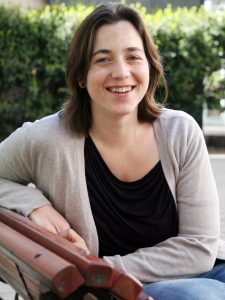
Most of the empirical research on yoga has focused on white middle-class, middle-aged women living in Europe and the US. In most of these accounts, the practice of yoga has been portrayed as embedded in a wellness regime promoting a soft spirituality and a healthy life-style aimed at permanent self-optimization. Yoga, thus, has been read as a neoliberal technique used in an instrumental fashion. However, this portrait only tells one side of the story. Contemporary yoga scenarios are far more complex. Drawing on an intensive fieldwork among kundalini yoga students in two male prison in the outskirts of Barcelona, this presentation has a two-fold aim: first, to explore the ways in which yoga find its place in an environment dominated by working-class men (prisons) and contribute to transforming hegemonic conceptions of masculinity among inmates. Second, to examine the role of the volunteers that teach yoga in penitentiary institutions, and the practice of “karma yoga” as promoting a politics of personal and social emancipation. The presentation will end up calling for a more nuanced account on yoga practices that allow for a better understanding of the articulations between the practice of yoga and aspirations for social and personal transformation.
Dr. Jennifer Lea (University of Exeter): ”I’m going to be honest and … tell you that I feel like my emotions are all over the place right now”: The work of doing aesthetic and emotional labour in contemporary yoga teaching.
This presentation draws on my recent research which has approached yoga through the lens of work. Through in-depth interviews carried out with yoga teachers in the South West of England, the research looks at the kinds of work that yoga teachers do, as well as the impacts of this work on them as workers. Here I will focus on the aesthetic and emotional labour carried out by teachers, both in and out of the yoga studio. Firstly, I will outline what these traditionally feminized forms of labour (see Hothschild 2012, Mears 2014) look like in the field of yoga teaching. To follow, I will look at the various impacts of doing this kind of work – with particular focus on how the teachers variously experience managing the look and feel of their bodies, and how they understand yoga itself to mediate the (broadly negatively conceptualized) effects of doing this aesthetic and emotional labour. To conclude, I will offer some thoughts about the effects of the COVID-19 pandemic on the work that yoga teachers are doing.
Panel presentations
Panel 1: Activism, feminism and inclusion in/through yoga
Ella Poutiainen (University of Turku): Feminism, women’s spirituality and social change
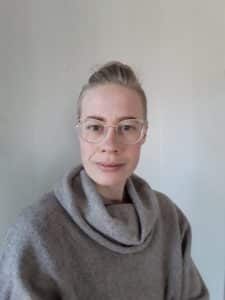 My research deals with different practices of holistic spirituality that are aimed at women and that reflect – implicitly or explicitly – feminist discourses and practices. Feminist undertones are increasing within the field of women’s spirituality, that often stress themes of womens empowerment and societal change. However, the intersections and tensions between contemporary feminisms and the women-dominated practices of holistic spirituality are puzzling. On one side, inspite of seemingly feminist agendas within practices of women’s spirituality, an explicit identification with feminism is often vague or lacking. Sometimes there’s even a suspicious or indifferent attitude towards the F word. On the other side, Western feminism has been accused of secular biases and an indifference toward religion. Indeed, New Age has been criticised by feminists for being essentialist and irrational, and thus undermining the advantages made by feminism. Yet studies have shown that along the secularisation of Western societies women, compared to men, are more drawn to religiosity in general and practices of holistic spirituality in particular. The extent to which 21st century Western women turn to spirituality for empowerment and societal change makes it a critical issue for feminists. Hence, I’m interested in the multilple ways that feminism and practices of women’s spirituality stick to and repel each other in our contemporary postsecular condition. I do ethnographic research within the fields of women’s yoga, ayurveda, neoshamanism and other New Age inspired spiritual practices both in Finnish and Euro- American contexts. Through the lens of feminist new materialism and affect theory I explore how women’s spiritual practices stretch the understanding of political agency and can serve as a site for political subjectivity.
My research deals with different practices of holistic spirituality that are aimed at women and that reflect – implicitly or explicitly – feminist discourses and practices. Feminist undertones are increasing within the field of women’s spirituality, that often stress themes of womens empowerment and societal change. However, the intersections and tensions between contemporary feminisms and the women-dominated practices of holistic spirituality are puzzling. On one side, inspite of seemingly feminist agendas within practices of women’s spirituality, an explicit identification with feminism is often vague or lacking. Sometimes there’s even a suspicious or indifferent attitude towards the F word. On the other side, Western feminism has been accused of secular biases and an indifference toward religion. Indeed, New Age has been criticised by feminists for being essentialist and irrational, and thus undermining the advantages made by feminism. Yet studies have shown that along the secularisation of Western societies women, compared to men, are more drawn to religiosity in general and practices of holistic spirituality in particular. The extent to which 21st century Western women turn to spirituality for empowerment and societal change makes it a critical issue for feminists. Hence, I’m interested in the multilple ways that feminism and practices of women’s spirituality stick to and repel each other in our contemporary postsecular condition. I do ethnographic research within the fields of women’s yoga, ayurveda, neoshamanism and other New Age inspired spiritual practices both in Finnish and Euro- American contexts. Through the lens of feminist new materialism and affect theory I explore how women’s spiritual practices stretch the understanding of political agency and can serve as a site for political subjectivity.
Dr. Cassandra Ellerbe (Bard College Berlin): Kemetic Yoga and Healing Circles as a Form of Resistance for BIPOC1 Women in Germany
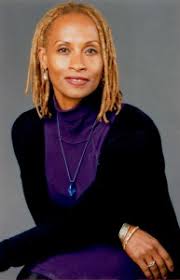 Many BIPOC womxn2 living in Germany find themselves entangled daily within the intersections of racism, sexism, and other forms of discrimination. The manifestation of these intersections often creates stress levels, which over time, force some members of this group into a constant psychological and physical “fight or flight” mode and “dis-ease”. In recent years many members of this group living in the city of Berlin have come to look to the words of the Black lesbian warrior poet Audre Lorde “Caring for myself is not self-indulgent, it is self-preservation, and is a political act of warfare“3 not only as a source of inspiration, but also as a form of resistance. My observation of BIPOC groups on Instagram and Facebook indicate that the practice of Yoga along with an array of other self-care practices are now becoming very closely linked with activism and “out – loud” resistance. However, the dominance of whites within the world of Hatha Yoga in Germany, has prompted many BIPOC womxn to discover the practice of Kemetic Yoga4 and participate in BIPOC womxn only healing circles, whilst creating safe and empowering spaces for themselves. With the assistance of multi-sited ethnography (Marcus 1995) and intersectional theory (Crenshaw 1989), I seek to examine how some individuals of this group, especially in the city of Berlin are utilising Kemetic Yoga and BIPOC womxn exclusive healing circles to not only practice self-care, but also as a “political act of warfare”.
Many BIPOC womxn2 living in Germany find themselves entangled daily within the intersections of racism, sexism, and other forms of discrimination. The manifestation of these intersections often creates stress levels, which over time, force some members of this group into a constant psychological and physical “fight or flight” mode and “dis-ease”. In recent years many members of this group living in the city of Berlin have come to look to the words of the Black lesbian warrior poet Audre Lorde “Caring for myself is not self-indulgent, it is self-preservation, and is a political act of warfare“3 not only as a source of inspiration, but also as a form of resistance. My observation of BIPOC groups on Instagram and Facebook indicate that the practice of Yoga along with an array of other self-care practices are now becoming very closely linked with activism and “out – loud” resistance. However, the dominance of whites within the world of Hatha Yoga in Germany, has prompted many BIPOC womxn to discover the practice of Kemetic Yoga4 and participate in BIPOC womxn only healing circles, whilst creating safe and empowering spaces for themselves. With the assistance of multi-sited ethnography (Marcus 1995) and intersectional theory (Crenshaw 1989), I seek to examine how some individuals of this group, especially in the city of Berlin are utilising Kemetic Yoga and BIPOC womxn exclusive healing circles to not only practice self-care, but also as a “political act of warfare”.
Notes:
1 BIPOC is the acronym for Black, indigenous People of Colour.
2 I utilize the spelling of the term “womxn” to include transgender women identified persons.
3 Audre Lorde (1988).
4 Kemetic Yoga is a form of Yoga that originated in ancient Egypt. Kemet is the ancient Egyptian name of Egypt.
Prof. Dr. Esther Sanchez-Pardo (University of Madrid): Yoga for Educators: Affect and Accountability in a Culturally Diverse Environment
 With a long history of practice in the West and fitting perfectly within the routine habits of an urban, middle-class society seeking wellness, comfort and a holistic discipline to assuage the uncertainties and stress disorders assailing us, yoga has become a priority for a growing number of people. Even if one does not practice, it is hard not to notice the many references to yoga that appear daily in popular culture. This increasing familiarity with yoga and its benefits in so many domains, has led more and more institutions and educators to consider the advantages of its inclusion within the regular teachers’ training curricula at present.
With a long history of practice in the West and fitting perfectly within the routine habits of an urban, middle-class society seeking wellness, comfort and a holistic discipline to assuage the uncertainties and stress disorders assailing us, yoga has become a priority for a growing number of people. Even if one does not practice, it is hard not to notice the many references to yoga that appear daily in popular culture. This increasing familiarity with yoga and its benefits in so many domains, has led more and more institutions and educators to consider the advantages of its inclusion within the regular teachers’ training curricula at present.
This paper aims at showing to what extent, within the frame of teachers’ training for the culturally diverse classroom -where different identities, nationalities, ethnicities and religions co-exist-, yoga is a much needed source of knowledge and practice in mobilizing affect and accountability among students to create a safe and inclusive atmosphere based on equality and respectful of differences. This paper is part on an ongoing project within my teaching for the last three years within the MA programs in Teacher Training, and Gender Studies at U. Complutense. The inclusion of specific modules on yoga with an emphasis on intersectional feminism has brought about a huge interest in questions of vulnerability, social exclusion, intolerance and an active critique on the regimes of invisibility (B. Latour 2010) operating in our society. An intersectionally-inflected yoga practice has brought about a very fruitful, research oriented and inquisitive class dynamics.
Issues such as understanding and living fully the mind-body symbiosis, strengthening our inner core, making progress into self-knowledge, and delving into meditation for peaceful living, count among the prominent successful outcomes of yoga training. It is my contention that other crucial issues such as accountability have not been sufficiently addressed. Drawing from Judith Butler’s reflection on accountability (2005) within the context of ethical life, and the moral self’s complicity with violence, and a growing concern in yoga-oriented education for matters moving from the individual to the social world (Berila et al eds. 2016, Spinazzola 2011), this paper aims at discussing how by raising awareness on differences, and mobilizing affect in the classroom, one can work toward an inclusive, equity pedagogy with recourse to yoga and intersectionality.
Dr. Caroline Nizard (Lausanne University): Representations and paradoxes of modern yoga (well-being, sport and spirituality)
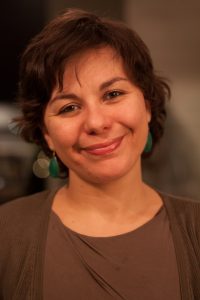 Thanks to sixty semi-directive interviews conducted with yoga practitioners and/or teachers and participant observations in French Switzerland, France and India, between 2013 and 2018, this proposal wishes, first, to question the social characteristics of modern yoga practitioners, and second, to compare some visible aspects of yoga, particularly around representations linked to well-being, spirituality, aesthetics, and the invisible aspects of reality experienced, and observed in the field.
Thanks to sixty semi-directive interviews conducted with yoga practitioners and/or teachers and participant observations in French Switzerland, France and India, between 2013 and 2018, this proposal wishes, first, to question the social characteristics of modern yoga practitioners, and second, to compare some visible aspects of yoga, particularly around representations linked to well-being, spirituality, aesthetics, and the invisible aspects of reality experienced, and observed in the field.
Like Hoyez (2012), Newcombe (2017), my research (2019) has shown specific social characteristics of yoga practitioners. It is a gendered activity, mainly done by female, with an average age around 40 years old and primarily belonging to higher social categories. In India, the percentage of men was more important on my fields. However, in recent years, in France and Switzerland, yoga has become increasingly popular and attracts people from more diverse social backgrounds, men and younger people. The hypothesis explaining this change could be (a) a growing sportivization, (b) a stronger craze for wellness practices, (c) the use of new technologies (internet, applications).
Secondly, I would like to examine three paradoxes that run through the representations, discourses and practices of “modern yoga” (De Michelis, 2003):
- The question of aesthetics versus the “respect of the body of each person” defended as a value of yoga (i.e. “curvy yoga”
- Non-competition versus a growing sportivization in sports halls in France or Switzerland or during yoga championships in India.
- The will to secularize the practices and at the same time to claim a “spiritual quest”. Yoga practitioners are often affiliated to new religious movements or New Age practices, yet my fields do not fit with these definitions.
Most of the teachers and practitioners I met criticized the new modalities of mainstream yoga (commercialization, performance, aesthetics, well-being). However, the observation of practices shows that these same actors appropriate these representations.
Panel 2: The politics and spirituality of self-care practices
Prof. Dr. Sarah De Mul (Open University Netherlands): Tango as a Matter of Care in Neoliberal Brussels
 An oft-cited symbol of Argentine national identity, tango’s allure endures for practitioners worldwide. Drawing on archival and ethnographic research, Savigliano (1995) notably demonstrated tango’s historical and contemporary imbrication in struggles around ethnicity, race, labour, and sex. Recent studies have addressed the eroticized, sexualized and exoticist practice and image of tango dancing and also explored how the heteronormativity, notions of ‘exoticism’ and hierarchies of sexuality and gender embodied in tango dancing are increasingly challenged (e.g. Davis 2015).
An oft-cited symbol of Argentine national identity, tango’s allure endures for practitioners worldwide. Drawing on archival and ethnographic research, Savigliano (1995) notably demonstrated tango’s historical and contemporary imbrication in struggles around ethnicity, race, labour, and sex. Recent studies have addressed the eroticized, sexualized and exoticist practice and image of tango dancing and also explored how the heteronormativity, notions of ‘exoticism’ and hierarchies of sexuality and gender embodied in tango dancing are increasingly challenged (e.g. Davis 2015).
In line with these recent strands of feminist and postcolonial scholarship of tango, I will discuss contemporary engagements with tango dancing in the Western European neoliberal metropolis of Brussels by situating these within debates regarding the complicities and resistance of mind-spirit practices within global neoliberal culture. More specifically, I will propose to view tango as a matter of “care”, which is not understood as “a feel-good attitude,” but rather—referring to the work of Maria Puig de la Bellacasa—through dimensions of affect/affection, labour/work, and ethics/politics. I will analyse representations of tango as a matter of care in three different texts: a collection of tango photography, Claire Delville’s short story ‘Dernier tango à Bruxelles’, and testimonials of tango dancers. In so doing I hope to offer new insights into the transnational negotiation of body mind practices such as tango dancing, its critiques and its role in the shaping of (post)modern cosmopolitan lifestyles. In particular, my aim is to expose how tango dancers in brussels use an aresenal of corporeal tactics to manage life and pain under neoliberalism though selfcare and care for others.
Dr. Aliette Lambert (University of Exeter): The liberatory potential of Tantra yoga
 This exploratory ethnography of a yoga centre in southwest England grounded in a Tantrik tradition aims to explore potential correctives to dominant neoliberal capitalist subjectivities, asking: how can liberatory Tantrik practices become embodied and embedded into western ways of being? Many studies have explored the neoliberal co-optation of an aerobic type of postural yoga pervasive in the west – catering to individualist ‘self-projects’ of predominately white/western/upper or middle class and able-bodied women. But few examine practices of resistance to a neoliberal-capitalist regime of truth that emerge organically from ‘Yoga’ as it is arguably meant to be experienced: as a spiritual practice where the individual, drawing on techniques including but not limited to asana (postures), works towards connecting to all-pervasive Conscious awareness (cit-sakti). This is the focus of teaching at the Yoga centre, whose female director teaches processes of revitalising and re-establishing the connection to the self, others, phenomenological world and spirit, from which we are estranged in a neoliberal-capitalist system. Where non-dual Śaiva Tantricism entreats individuals to identify with absolute Consciousness, neoliberal thought asks individuals to identify largely with their possessions, positions, and other objects in the material world, creating ‘contraction’, or in Marxist terms ‘alienation’, from the True self (consciousness from which we all manifest). The three ‘impurities’ (malas) in the Tantrik perspective read like the three tenets of neoliberalism: the impurity of individuality (ānava-mala); the impurity of differentiation (māyīya-mala); and the impurity of action (karma-mala). Significantly, whereas neoliberal-capitalism propagates patriarchal tradition and avers ‘masculine’ traits, Tantrik tradition is grounded in a divine dance of masculine and feminine powers, with arguably a greater focus on the latter. Reflecting on initial findings, this project demonstrates how liberatory practices emanating from Tantra can create a more diverse and accepting form of ‘western’ yoga that realises a liberatory potential and works towards a more just society.
This exploratory ethnography of a yoga centre in southwest England grounded in a Tantrik tradition aims to explore potential correctives to dominant neoliberal capitalist subjectivities, asking: how can liberatory Tantrik practices become embodied and embedded into western ways of being? Many studies have explored the neoliberal co-optation of an aerobic type of postural yoga pervasive in the west – catering to individualist ‘self-projects’ of predominately white/western/upper or middle class and able-bodied women. But few examine practices of resistance to a neoliberal-capitalist regime of truth that emerge organically from ‘Yoga’ as it is arguably meant to be experienced: as a spiritual practice where the individual, drawing on techniques including but not limited to asana (postures), works towards connecting to all-pervasive Conscious awareness (cit-sakti). This is the focus of teaching at the Yoga centre, whose female director teaches processes of revitalising and re-establishing the connection to the self, others, phenomenological world and spirit, from which we are estranged in a neoliberal-capitalist system. Where non-dual Śaiva Tantricism entreats individuals to identify with absolute Consciousness, neoliberal thought asks individuals to identify largely with their possessions, positions, and other objects in the material world, creating ‘contraction’, or in Marxist terms ‘alienation’, from the True self (consciousness from which we all manifest). The three ‘impurities’ (malas) in the Tantrik perspective read like the three tenets of neoliberalism: the impurity of individuality (ānava-mala); the impurity of differentiation (māyīya-mala); and the impurity of action (karma-mala). Significantly, whereas neoliberal-capitalism propagates patriarchal tradition and avers ‘masculine’ traits, Tantrik tradition is grounded in a divine dance of masculine and feminine powers, with arguably a greater focus on the latter. Reflecting on initial findings, this project demonstrates how liberatory practices emanating from Tantra can create a more diverse and accepting form of ‘western’ yoga that realises a liberatory potential and works towards a more just society.
Gemma Lucas (University of Exeter): The enactment of ‘the (gendered) natural’ within spiritual assemblages
This paper draws on ethnographic fieldwork at a yoga studio in the North of England. I focus on my participation within a ‘Red Tent Circle’ held within this studio. ‘Red Tent Circles’ are New Age spiritual practices (Longman, 2018) which, I suggest, invite a conscious entangling of self, nature and ‘divine femininity’ in a particularly revealing example of what Gregory (2016) calls a ‘spiritual assemblage’. In this, the borders of human, nonhuman and intangible life become porous in the participant’s quest to learn a new “way or mode of relating to the self” (Ibid.: 239). I will extend Gregory’s concept to consider which forms of life beyond the human are privileged within New Age spiritual assemblages, arguing they enact a construction of the ‘natural’ that intersects with gender. I consider the potential for this enactment of ‘the (gendered) natural’ to both challenge dualistic conceptions that historically oppressed women and other marginalised groups and to foster regressive gendered idea(l)s which affiliate ‘Real’ womanhood with ‘nature’. I then consider how this ‘(gendered) natural’ similarly emerged in other ways within the materials, ideas, practices, and discourses of the yoga studio and the impact this had on my participants’ experience of their gendered selves.
Dr. Emanuela Mangiarotti (University of Genoa): Embodying self-care: Women in yoga
 The practice of yoga has grown worldwide and has been increasingly associated with individ-ual and communal empowerment, self-care and social change. Yet, a growing body of research in-tersecting feminist and critical yoga studies shows how the Western yoga scene is entangled with relations of privilege and marginality across gender, race, sexuality, class and body-size. Issues of accessibility, cultural appropriation, social control, and (re)marginalisation of certain groups and communities are beginning to haunt the yoga community, especially in contexts that claim a yogic ethics of self and collective care. Based on my fieldwork in Italy, this contribution discusses how, in the realm of neoliberal precarity, the yoga industry offers practitioners a life regime of, experienced by, and inscribed in the body that is meant to transcend physiological boundaries and expand indi-vidual and collective awareness. Thus, yoga configures a politics of the body that moulds a new ex-istential framework for the socially embodied self. In this context, women and specific notions of womanhood are key to a promise of wellness, healing and self-realisation that materialises white, cisgender, moneyed, slender female practitioners as embodiments of the proper way to self-care and ethical living. Relying on a feminist notion of self-care, the contribution is particularly concerned with how women – as the majority of practitioners – get caught up in, contribute to mould or active-ly challenge relations of privilege and marginality, as the yoga industry provides a repertoire of practices that adhere to and reproduce an oppressive feminine norm.
The practice of yoga has grown worldwide and has been increasingly associated with individ-ual and communal empowerment, self-care and social change. Yet, a growing body of research in-tersecting feminist and critical yoga studies shows how the Western yoga scene is entangled with relations of privilege and marginality across gender, race, sexuality, class and body-size. Issues of accessibility, cultural appropriation, social control, and (re)marginalisation of certain groups and communities are beginning to haunt the yoga community, especially in contexts that claim a yogic ethics of self and collective care. Based on my fieldwork in Italy, this contribution discusses how, in the realm of neoliberal precarity, the yoga industry offers practitioners a life regime of, experienced by, and inscribed in the body that is meant to transcend physiological boundaries and expand indi-vidual and collective awareness. Thus, yoga configures a politics of the body that moulds a new ex-istential framework for the socially embodied self. In this context, women and specific notions of womanhood are key to a promise of wellness, healing and self-realisation that materialises white, cisgender, moneyed, slender female practitioners as embodiments of the proper way to self-care and ethical living. Relying on a feminist notion of self-care, the contribution is particularly concerned with how women – as the majority of practitioners – get caught up in, contribute to mould or active-ly challenge relations of privilege and marginality, as the yoga industry provides a repertoire of practices that adhere to and reproduce an oppressive feminine norm.